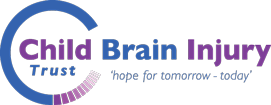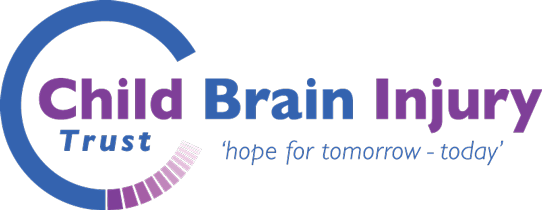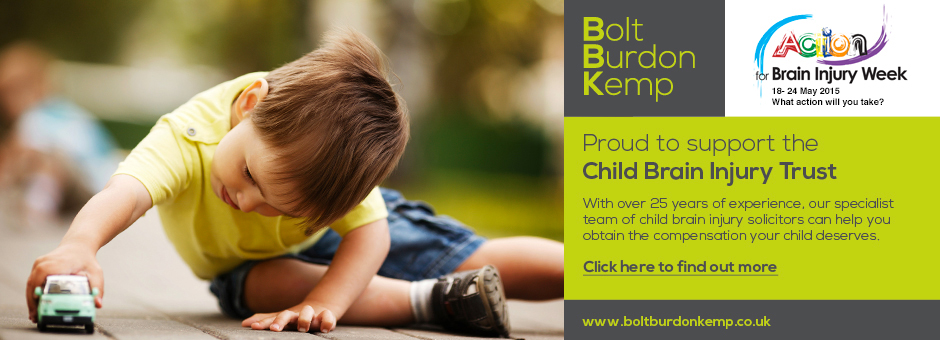‘Jake’s’ unsung heroes
In aid of the Child Brain Injury Trust’s campaign for action for brain injury week, I thought I would share the story of my client Jake (not his real name) and the unsung heroes helping him on his journey.
Jake was born in 2008. He was the only child of well educated, professional parents. He was a bright, happy little boy. He learnt to walk and talk early and started at nursery four days a week when he was one year old. He enjoyed it and was doing well.
In 2010, at the age of 2 years and 3 months, he suffered serious head and brain injuries in a road traffic accident. His frontal bone and eye socket were fractured and air was trapped inside the skull and socket (pneumocranium and pneumo-orbit) He had extensive bruising (contusion) of the frontal and temporal lobes of the brain and left sided subarachnoid haemorrhage.
He received excellent care in hospital and was discharged home very soon after the accident. He eventually went back to nursery school, four months later, for one day a week.
The nursery school was immediately concerned about his behaviour. He had extreme temper tantrums with violence, biting and scratching, several times a week and frequent emotional outbursts. The teachers found his behaviour unmanageable and Jake was asked to leave after only three months.
His parents found a small independent nursery and he started there in the autumn, a year after his accident. Jake was in a small class of just six children. This was easier for Jake and for his teacher, but even so there were problems.
Jake’s speech and conversation were clear and he was sociable and keen to make friends. But he could be overly tactile and the other children did not like that. He couldn’t recognise personal space or boundaries and would barge to the front of the queue, unaware that he was upsetting his class mates. He was very disinhibited in his conversation and in his behaviour, often appearing rude. He would go up to strangers and hold their hand, interrupting their conversation. His conversation always followed his own agenda with no recognition of social “rules”.
Jake had real difficulties with concentration and attention. In one-to-one lessons he could make some progress but in larger groups, he would quickly lose interest and his attention would wander when having to wait his turn. He would have tantrums, was disobedient and aggressive. He got tired very easily and then his concentration and behaviour would deteriorate even further. However, when he was left to his own devices he was not disruptive. So the teacher often allowed him to play by himself. She did not have the time to focus the necessary attention on him to the detriment of the other children.
When he moved from nursery into Year 1, his teacher allowed him a relatively free rein. She let him play on his own for long periods to minimise disruption and if his class went on a school trip she would put him into the nursery class for the day instead. This meant Jake was not disruptive but he was completely missing out on his education.
By the time I was instructed, Jake had fallen significantly behind the other children. His reading and writing were poor. It was plain that his difficulties with attention, concentration, and behaviour would increase when the time came for him to move up into the more challenging and structured work of Year 2. He would not attain the same academic level as he would have done had he not been injured, with inevitable consequences for his employment opportunities.
The class and head teacher were reluctantly beginning to acknowledge that the school did not have sufficient knowledge or resources to manage the situation and Jake’s place at his independent school was potentially in jeopardy.
Jake was, however, still very young and, as the frontal lobes of the brain do not fully mature until at least the late teens, there was an opportunity for Jake to make some real progress, with the right support.
I identified that Jake’s most urgent needs were for, firstly an educational psychologist, to advise both his family and his teachers how to manage his behaviour and his learning needs, and, secondly, a Higher Level Teaching Assistant (HLTA), to support him in the classroom.
I obtained a substantial interim payment to allow the school to recruit a Higher Level Teaching Assistant. The interim payment also paid for an educational psychologist and specialist brain injury case manager to support the recruitment and interview process and ensure the right teaching assistant was appointed for Jake. The HLTA started at the end of the first term of Year 2 and now, only three months in, Jake is showing a real improvement in his behaviour. The HLTA works closely with the class teacher to ensure that Jake is supported but not singled out. Together they encourage Jake to do the work with the other children. With the advice of the educational psychologist, they are using strategies to keep Jake on task and to help him recognise boundaries and the personal space of others. Jake’s temper tantrums and violent outbursts are decreasing as his frustrations decrease and although there is a long way to go, there is much more hope for Jake’s future.
With evidence from the head teacher, class teacher, HLTA and educational psychologist, I will be applying for an Education Health and Care Needs Assessment for Jake to move to mainstream education. In the meantime, I would like to offer a resounding “thank you” to the Head Teacher at his independent school, who did not give up on Jake but was open to advice and suggestions from people outside the school, and also to his class teacher and HLTA, who have worked so closely together to provide sensitive and intelligent support.
I am a Partner at Bolt Burdon Kemp specialising in Child Brain Injury claims. If you would like advice about making a claim for compensation for your child, please contact me free of charge and in confidence on 020 7288 4825 or at jochapman@boltburdonkemp.co.uk


